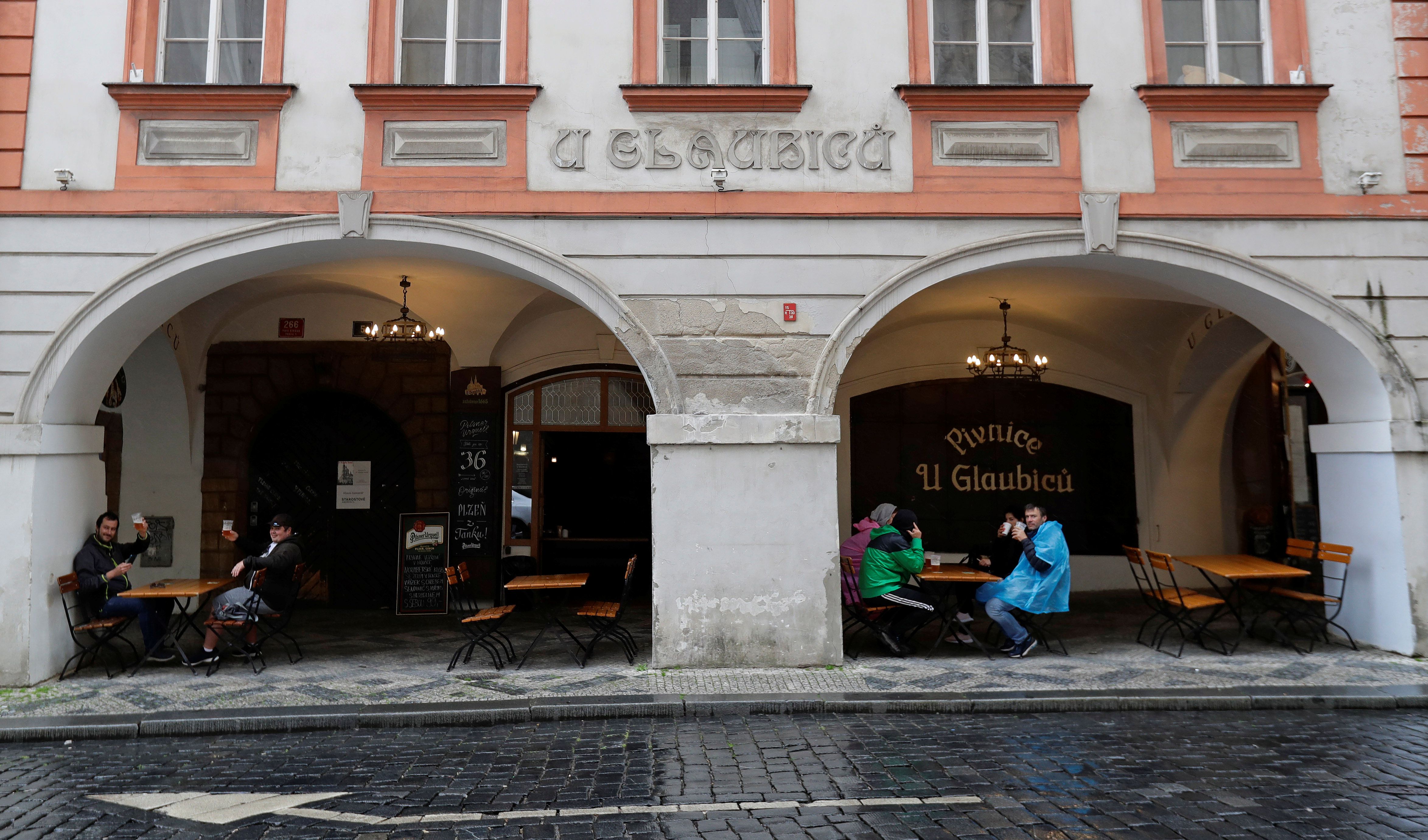Czechs on the Leading Edge in Dealing with COVID-19

The course of the SARS-CoV-2 pandemic in Czechia showed that the country managed to flatten the disease curve by the beginning of April. The first three cases of COVID-19 were recorded there on 1 March and the peak of infections came on 27 March, when the daily increase was 373 infected people. The number of new cases has been steadily decreasing since then, reaching 20 on 17 May. However, the 8,475 cases in Czechia, given the size of its population, means its incidence is still higher than in the rest of the V4 countries (Hungary, Poland, Slovakia). Mortality on 298 deaths is 2.8 per 100,000 residents, which is lower than in Hungary (4.7), about the same as in Poland (2.4), but much higher than in Slovakia (0.5). The main reason for the limited extent of the spread of the coronavirus in Czechia has been the relatively high number of tests (the widest programme among the V4 countries) of 3,298 per 100,000 residents.
The relatively good state of the healthcare system means there has been a low risk of overloading. Expenditures on healthcare are around €2,300 per inhabitant, which is the highest after Malta among the countries that joined the EU since 2004. In the number of critical care beds, Czechia has 4.1 per 1,000 inhabitants, which is above the EU average (3.7). Thanks to these conditions, the Czech government has been able to offer France help in the treatment of COVID-19 patients.
Introduction and Removal of Restrictions
Czechia was one of the first EU countries to introduce restrictions related to the coronavirus. The precautionary measures were taken prior to the first cases of infection. On 30 January, Czechia stopped issuing visas to Chinese citizens, and on 8 February, suspended flights from that country. Most of the restrictions, including closing borders, schools, and universities, as well as limitations on business activity, were introduced in mid-March. In addition, on 20 March the Czech government—the first in the EU—made covering the mouth and nose outside of the home obligatory.
The flattened infection curve, good condition of its health service, and the prospects of an economic crisis caused by the pandemic prompted the Czech government to loosen the restrictions in the first half of April. Czechia, along with Austria, Denmark, and Germany, was among the first EU countries to relax the measures. Babiš’s cabinet has accelerated the lifting of restrictions as part of a plan presented on 14 April. Accordingly, the last of the five stages of lifting the restrictions, including opening restaurants and hotels, will be implemented not on 8 June, as previously announced, but on 25 May. On the same day, the recommendation to cover one’s mouth and nose outside the home will cease to be obligatory.
Plans to Save the Economy
The harm caused by the pandemic on Czech industry and exports will result in a lower GDP. In Czechia, which is the second-largest car producer in the world after Slovakia in relation to population, production was suspended by, among others, Škoda Auto, the country’s largest exporter. In annual terms, industrial production decreased by 10.8% in March and exports by 13.4%. The International Monetary Fund forecasts a decline in the Czech GDP this year by 6.5%, and the European Commission (EC) by 6.2%. In addition, Czechia’s unemployment rate increased from 2% in February to 3% in March, and then to 3.4% in April. However, the country still enjoys the title of the Member State with the lowest unemployment in the EU.
In response to the economic problems, the Czech government has presented support packages for businesses. They include tax exemptions, low-interest loans, extension of the deadline for submitting a tax declaration or the possibility of shortened working time with state funding of employees’ salaries. Moreover, the Czech National Bank has cut interest rates twice to 0.25%. Deputy Prime Minister Karl Havlíček also announced a plan to enable businesses to apply for support to pay up to 50% of their rental costs.
Babiš also wants to avoid raising taxes to pay for the response. He pushed through parliament an increase in this year’s budget deficit from an estimated €1.5 billion to around €11 billion. Furthermore, the government plans to reduce taxes in the sectors most affected by the pandemic, for example, a reduction of VAT on hotel services from 15% to 10%. It also announced subsidies for scrapping old vehicles to encourage the purchase of new cars and thus help the domestic automotive industry. In turn, relief for the state budget may come from a reduction of politicians’ salaries, proposed by ANO’s government coalition partner the Czech Social Democratic Party (ČSSD).
Political Consequences
Acceptance of the government’s social actions in response to the pandemic have translated into stronger support for ANO. The restrictions were supported by about 80% of Czechs, and their abolition by 69%. According to a Kantar CZ poll conducted this month, Babiš’s party has 34% support (in the 2017 parliamentary elections, it got 29.6% of the votes). Second was the opposition Czech Pirate Party, with 16% support. ČSSD noted 5.5% support. One factor limiting public criticism of ANO was, among others, the ban on all assemblies, which ended the mass anti-government demonstrations that had taken place throughout the country in the last year.
Babiš’s government does not have a parliamentary majority and is therefore unable to fully push through its measures to counter the pandemic. This was confirmed by the loss of a vote in the Chamber of Deputies on the extension of the state of emergency (cz. nouzový stav). applicable from 12 March. Initially adopted for 30 days, it was extended on 7 April to the end of the month, although the government called for another 30 days. The coalition also failed in a vote on 28 April to extend the state of emergency again. Finally, the Chamber of Deputies accepted the proposal of the Communist Party of Bohemia and Moravia to end it on 17 May. The consent of the Chamber of Deputies was obtained with the temporary extension of powers for the Ministry of Health.
At the same time, the government’s efforts to gradually restart the economy has resulted in disputes within the ANO-ČSSD coalition. The Social Democrats were sceptical of rapidly lifting the rules imposed under the state of emergency. The coalition’s lack of consistency was also highlighted by problems in coordinating ministerial communications.
Conclusions and Perspectives
Thanks to the Czech government’s rapid response to the pandemic and social discipline, visible, for example, in widespread compliance with the recommendation to wear face masks, Czechia quickly recorded a slowdown in infections. Its relatively good healthcare system contributed to a reduction of coronavirus-related mortality, despite having the highest incidence of infections in the V4.
The government’s actions have allowed it to maintain high support for ANO and have strengthened Babiš. At the same time, the difficulties of a minority cabinet have become apparent. In the government’s future actions, the main problem will not be so much the fragility of the coalition as the prospect of an economic recession and the associated risk of falling support for ANO, which has based its image on economic issues. Therefore, the Czech government will avoid raising taxes, the price of which will be further increases in the budget deficit. Coping with the effects of the climate crisis will also have an impact on the government’s performance. The Mendel University in Brno signals that Czechia is experiencing the largest drought in five centuries, which is already causing losses, especially in agriculture.
The experience of the Czechs, who hold the presidency of the Visegrad Group, in fighting the pandemic will be relevant in the group’s further activities. Although the V4 countries differed in their strategies to counteract the effects of the coronavirus, Babiš, on behalf of the V4, announced as part of the EC’s coordinated action the allocation of €3 million (€750,000 from each country) for vaccine development and treatment on COVID-19. Earlier, the V4 foreign ministers declared financial support for the Eastern Partnership countries to fight the pandemic with up to €250,000. These actions will be the starting point for further activities of the group, which from July will be chaired by Poland.





